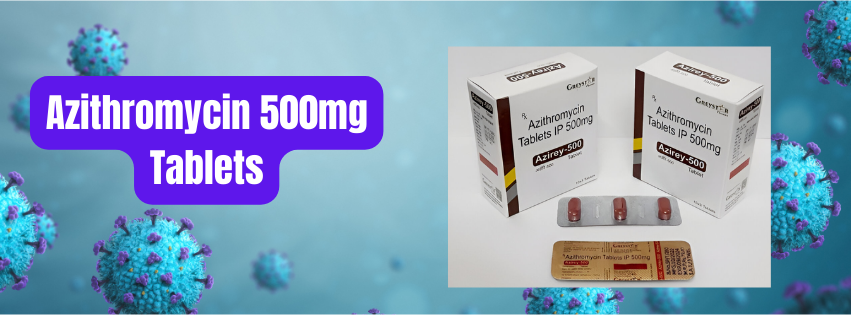- Your cart is empty
- Continue Shopping
Azithromycin 500mg

Azithromycin 500mg : COVID-19, an illness brought on by the SARS-CoV-2 virus, has impacted millions of people worldwide in late 2019. A wide range of drugs, including
the widely used antibiotic azithromycin, have been researched as people around the world look for efficient therapies.
Concerns regarding azithromycin’s safety and effectiveness for COVID-19 patients have been raised in relation to this medication on a regular basis.

Knowledge of azithromycin
The macrolide antibiotic azithromycin combats germs in the body. Many infections, such as skin, ear, and respiratory tract infections as well as sexually transmitted illnesses, are commonly treated with it.
Inhibiting bacterial protein synthesis is how azithromycin stops bacteria from
proliferating and expanding. Although azithromycin is an antibiotic, it is crucial to understand that it is ineffective against viruses, such as the coronavirus that causes COVID-19.
This distinction is important because it provides the framework for comprehending the reasons behind the scrutiny around azithromycin’s use in treating COVID-19.
The COVID-19 Epidemic and Its Treatment
Approaches Researchers and medical experts faced a deadline in the early stages of the COVID-19 epidemic in their search for efficient remedies. The potential advantages of azithromycin were rapidly recognized, particularly when used in conjunction with other drugs such as hydroxychloroquine.
Azithromycin was first reported to have antiviral qualities, which led some people to believe it could aid in the fight against COVID-19.
Because of its well-established safety profile and convenience of
administration in treating bacterial infections, experts have investigated its
usage in both hospitalized and outpatient settings.
But as research developed, a number of studies raised doubts about azithromycin’s efficacy in treating COVID-19.
Research Findings and Clinical Evidence
Research Results from a number of early studies on azithromycin’s
potential use in treating COVID-19 were mixed.
A tiny experiment, for instance, discovered that patients receiving azithromycin with
hydroxychloroquine demonstrated some viral clearance; nonetheless, the
study was criticized due to significant bias risk and design flaws.
On the other hand, more extensive and stringent randomized controlled trials with
thousands of participants have mostly not been able to show that azithromycin is significantly beneficial in treating COVID-19.
● Cochrane Evaluation:
Azithromycin did not lower mortality or enhance clinical outcomes in COVID-19 patients, either in inpatient settings or for those with moderate symptoms, according to this thorough evaluation that incorporated data from several studies.
● Trial for Recovery:
Azithromycin’s effect on hospitalized COVID-19 patients was evaluated in this important trial, which similarly reported no change in recovery times or fatality rates.
Studies on Outpatients
Similar results were seen in studies investigating the role of azithromycin in outpatient settings, particularly in patients with moderate symptoms.
Azithromycin’s effectiveness in treating COVID-1923 appears to be further undermined by reports that it did not lessen hospitalization rates, illness progression, or mortality in these individuals.
Studies on Outpatients
Similar results were seen in studies investigating the role of azithromycin in outpatient settings, particularly in patients with moderate symptoms.
Azithromycin’s effectiveness in treating COVID-1923 appears to be further undermined by reports that it did not lessen hospitalization rates, illness progression, or mortality in these individuals.
Azithromycin’s Mode of Action:
Azithromycin has certain characteristics that make it a potential candidate for additional research even though it is ineffective against SARS-CoV-2:
● Antiviral Action :
Azithromycin’s ability to combat different viruses in vitro, or in the lab, has been shown in a few investigations. Patients who are experiencing severe COVID-19-related inflammation may benefit from azithromycin’s ability to control immunological responses.
It is believed that the medication may change ACE2 glycosylation, which
impacts the virus’s ability to penetrate cells.
● Features That Reduce Inflammation :
Furthermore, azithromycin has anti-inflammatory properties that may help individuals with COVID-19-related severe inflammatory reactions, including cytokine storms.
The immune system overreacts, doing more damage to the body than good, leading to this reaction. But there is still inconsistent and equivocal clinical evidence about
this advantage, particularly for COVID-19.
Adverse Reactions and Indications
Even though azithromycin is usually well tolerated, adverse effects are still possible. Typical negative responses consist of:
● Disorders of the Gastrointestines:
Vomiting, diarrhea, nausea, and stomach pain.
● Allergic reactions :
Rarely, individuals may develop a severe allergic reaction to azithromycin.
● Heart Problems:
Prolonged QT intervals on electrocardiograms have been linked to
azithromycin, and these can result in severe cardiac arrhythmias.

Guidelines and Suggestions
Current Global health agencies like the CDC and WHO have not recommended azithromycin as a standard treatment for COVID-19 as of yet, especially when there isn’t a bacterial infection.
Because there is insufficient high-quality data to support azithromycin’s efficacy, the WHO advises against using it outside of clinical trials.
As part of a patient’s treatment plan, healthcare professionals should closely adhere to these recommendations and only use azithromycin in cases of a confirmed and
obvious bacterial infection.
Antibiotic resistance is a serious public health issue that existed long before the epidemic and might be exacerbated by inappropriate prescribing.
Conclusion: Azithromycin 500
Azithromycin 500 mg treatment for COVID-19 presents important considerations regarding the relationship between viral infections and antibiotic use.
Azithromycin does not enhance clinical outcomes for COVID-19 patients, despite early excitement about its possible advantages, and there are dangers related to its adverse effects.
This is supported by extensive clinical evidence. It is crucial to follow evidence-based
recommendations, and azithromycin should only be used in COVID-19
cases when a bacterial superinfection has been verified.
The most effective ways to treat this complicated illness will become clearer as long as
research and trials on COVID-19 are conducted. In light of COVID-19, it is critical for both patients and healthcare professionals to stay informed on the efficacy and safety of the drugs being utilized.
FAQ: Azithromycin 500
1. Can COVID-19 patients benefit from azithromycin treatment?
According to numerous research, azithromycin does not improve treatment
outcomes or reduce mortality rates in COVID-19 patients.
2. Can adverse reactions occur from azithromycin?
Vomiting, allergic reactions, and even heart problems like prolonged QT intervals.
3. Are all users of azithromycin safe?
While azithromycin is usually safe, use caution when using it, especially if you already have cardiac problems or are taking other medications that could lengthen your QT interval.
4. When is it advised to take azithromycin?
Unless there is a concurrent bacterial illness, azithromycin should only be
used to treat confirmed bacterial infections. It should not be used to treat
COVID-19.
5. How should I handle a COVID-19 infection?
It’s critical to consult a healthcare provider if you think you may have COVID-19 in order to choose the best course of action for testing and treatment.
Shop Now: Azithromycin 500mg Tablets

